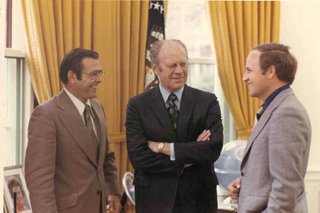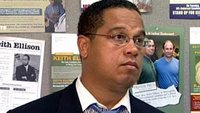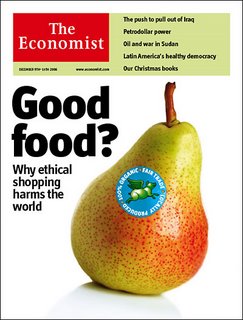If, by now, you believe Bush’s nice talk about bipartisanship after the mid-term elections; if you believe he would listen to the country or even to the recommendations of the Baker-Hamilton report on Iraq; if you believe that the good old days when members of both parties could problems over lunch in the Metropolitan Club; in fact, if you believe any of the president’s promises that he would reach across the aisle to work with all members of Congress; I'm sorry to say that you are very naive!
Not only has the Bush administration clearly shown that they are ready to do exactly the opposite of what the Baker-Hamilton report recommended on Iraq (The Economist) but they also continue to use the same strategy and conspicuously ignore anyone who disagrees with them - including Congress, old and new - in all sorts of ways.
Remember how John Bolton was nominated to the post of U.S. Ambassador to the United Nations by President George W. Bush without being ever confirmed by the Senate? (see here)
Well, it looks like Bush is doing it again. This is time with a nomination to CPB, the Corporation for Public Broadcasting in charge of public broadcasting (including PBS - Public Broadcasting Service - and NPR -National Public Radio).
Last Wednesday, the president nominated Warren Bell, a television sitcom producer and an outspoken right-wing conservative who writes for the neoconservative magazine The National Review to the board of CPB (LATimes). This nomination had been in the air for some time but concerns over Bell’s qualifications and a record of inflammatory remarks (regarding Democrats, women, minorities, and underprivileged people) had raised concerns in the Senate Commerce Committee by both Republicans and Democrats. (Media Matters)
But here’s the dirty trick used by Bush. He was able to "circumvent the need for Senate approval by naming Bell to the board Wednesday evening as a recess appointee". Talk about listening to the nation! As a result, Bell’s term will “last about a year, unless a permanent nominee for the seat is confirmed before then.” (LATimes)
Now this is the last move in an attempt for this administration not only to politicize public broadcasting but even to turn it into a political tool. And amazingly, it seems to be going quietly in the press. Other than the LATimes and a few blogs, I have not seen this news in a lot of mainstream media.
If you have any doubt that this is a deliberate move, look at what’s happened in the last 5 years:
- The CPB has nine board members who serve six-year terms and are selected by the President of the United States and confirmed by the Senate. Until now, the CPB board contained 4 Republicans (all nominated by Bush), 3 Democrats, and 1 independent.
- Two years ago, Kenneth Tomlinson, a close friend of Karl Rove, was appointed as chairman of the CPB board by President Bush. He claimed to purge CPB of what he perceived as "liberal bias." (Wiki) and he pursued aggressive policies of adding conservative viewpoint to CPB's programming. Ironically, he had to resign for allegedly violating both the federal law and the corporation's own rules and misusing federal money for his political agenda. (he was also accused of using "political tests" as a criteria for hiring top employees, exerting political influence over programming, and other offenses. FoxNews)
But you may wonder why Bush nominated a democrat (former Senator David H. Pryor) to the CPB board last June. Isn’t that a sign of “bipartisanship”? No, absolutely not. In fact, according to Public Broadcasting Act, the White House cannot appoint persons of the same political party to more than 5 of the 9 CPB board seats.
And with the nomination of Warren Bell, it all makes sense, doesn’t it?
And if you need more convincing look at this:
The move mirrors Bush's other recent promotion of one of his political advisers, Mark McKinnon, to the Broadcasting Board of Governors without Senate approval through the use of a recess appointment. The Cox News Service said McKinno's appointment will allow him to serve a year on the board before needing Senate approval. (M&C)
The Broadcasting Board of Governors is an ”independent” agency of the United States government, responsible for all U.S. government and government sponsored, non-military, international broadcasting (like V.O.A, Voice of America).
So if you think Bush is showing any respect for the democratic process, especially after the results of the mid-term elections, allow yourself to be disabused of that foolish notion forthwith. For this Scrooge, 'tis the season to screw the voters. To paraphrase Dickens: God bless us all, every (Republic)un.
Democracy, it's one helluva bitter pill to swallow, non?






















